There’s a particular strain of fantasy and science fiction that arises out of Russia that hits unexpected emotional and stylistic beats. Just like “Russian novel” has become shorthand for a kind of emotionally rich, intricately-plotted, doorstop-sized work of fiction, Russian novels that venture into more speculative and fantastical realms frequently do so in a particularly stylized, often cynical manner. Vivid imagery, fanatical devotion to obscure philosophies, and bleak endings abound.
The following five novels give a glimpse of the surreal side of post-Soviet life, often criticizing authoritarian tendencies, knee-jerk nationalism, and political maneuverings as they go. Their settings vary: some are set in a recognizable version of the former Soviet Union, while others venture into more fantastical realms. Together, they provide a skewed reflection of history and a distillation of regional and national anxieties.
The novels of the Strugatsky brothers, written over the course of several decades, serve as a kind of template for much of the fiction that has followed in their wake. Roadside Picnic (adapted for film by Andrei Tarkovsky as Stalker) is about the aftermath of contact with aliens, but largely centers around the insignificance and incomprehension of its human characters, and humanity as a whole. Hard to Be a God (adapted for film multiple times) is both a story of medieval intrigue and a tale of tragically clashing civilizations with wildly different technological levels. More recently, Sergei Lukyanenko’s Night Watch and its sequels showcase a secret battle between warring supernatural factions, but also satirize institutional cultures and bureaucracy along the way.
Tatyana Tolstaya, The Slynx
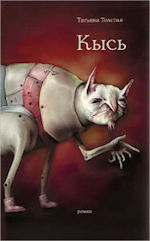 At first, the setting of Tatyana Tolstaya’s The Slynx might look familiar. It’s set in the aftermath of a nuclear war, and centers on a small community attempting to restore a semblance of normalcy in a radically altered environment. But it’s a very literary take on the post-apocalyptic subgenre: the local strongman has opted to comb through the remains of the area’s books and claim all of them as his own work. Also, many people have claws or tails, and some live for hundreds of years—in other words, this apocalypse has also altered the ground rules of reality. At once gritty and cartoonish, this is a dystopia unlike any you’ve seen before.
At first, the setting of Tatyana Tolstaya’s The Slynx might look familiar. It’s set in the aftermath of a nuclear war, and centers on a small community attempting to restore a semblance of normalcy in a radically altered environment. But it’s a very literary take on the post-apocalyptic subgenre: the local strongman has opted to comb through the remains of the area’s books and claim all of them as his own work. Also, many people have claws or tails, and some live for hundreds of years—in other words, this apocalypse has also altered the ground rules of reality. At once gritty and cartoonish, this is a dystopia unlike any you’ve seen before.
Mikhail Elizarov, The Librarian
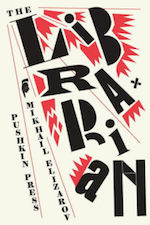 Secret societies and conspiracies abound in The Librarian. Very early in the novel, the reader learns of a forgotten author of propagandistic novels during the Soviet era, whose surviving books have taken on a strange quality: reading them can imbue a person with enhanced abilities, and can stave off physical and mental decline in the elderly. And thus, organizations crop up around particular collections of these books, and an uneasy truce is maintained between these warring factions. The protagonist of this novel inherits the role of librarian in one of these groups, and quickly discovers sinister plots afoot. But this absurd premise has a dark side: after reading one of the books, the hero experiences a vision, glimpsing a society that’s grotesquely nationalistic and racist, lending a haunting quality to the entire novel.
Secret societies and conspiracies abound in The Librarian. Very early in the novel, the reader learns of a forgotten author of propagandistic novels during the Soviet era, whose surviving books have taken on a strange quality: reading them can imbue a person with enhanced abilities, and can stave off physical and mental decline in the elderly. And thus, organizations crop up around particular collections of these books, and an uneasy truce is maintained between these warring factions. The protagonist of this novel inherits the role of librarian in one of these groups, and quickly discovers sinister plots afoot. But this absurd premise has a dark side: after reading one of the books, the hero experiences a vision, glimpsing a society that’s grotesquely nationalistic and racist, lending a haunting quality to the entire novel.
Victor Pelevin, The Sacred Book of the Werewolf
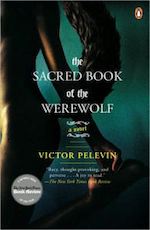 Immortal shape-shifters, contemporary Russian economics and politics, and military experimentation converge in this memorably bizarre novel from an author whose work frequently delves into the speculative and surreal. A. Huli is the narrator, an immortal who feeds on emotional energy and finds herself drawn to a werewolf with connections to the Russian military. Prophecies and ominous omens circle them both, and the novel that results is both a strange take on power dynamics and a cutting satire on post-Soviet life.
Immortal shape-shifters, contemporary Russian economics and politics, and military experimentation converge in this memorably bizarre novel from an author whose work frequently delves into the speculative and surreal. A. Huli is the narrator, an immortal who feeds on emotional energy and finds herself drawn to a werewolf with connections to the Russian military. Prophecies and ominous omens circle them both, and the novel that results is both a strange take on power dynamics and a cutting satire on post-Soviet life.
Alexei Nikitin, Y.T.
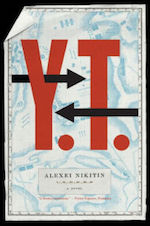 In Alexei Nikitin’s short novel, a thought experiment from the 1980s returns to haunt a man named Davidov—specifically, an alternate history of Europe and Asia that he and some of his fellow students envisioned for a strategy game during their early twenties. At times, it plays out like a geopolitically-minded post-Soviet take on Umberto Eco’s Foucault’s Pendulum. In other words, it’s the kind of novel in which conspiracies and mysteries overlap and cross-pollinate one another, and bizarre theories are presented and given the potential to roar into unexpected life.
In Alexei Nikitin’s short novel, a thought experiment from the 1980s returns to haunt a man named Davidov—specifically, an alternate history of Europe and Asia that he and some of his fellow students envisioned for a strategy game during their early twenties. At times, it plays out like a geopolitically-minded post-Soviet take on Umberto Eco’s Foucault’s Pendulum. In other words, it’s the kind of novel in which conspiracies and mysteries overlap and cross-pollinate one another, and bizarre theories are presented and given the potential to roar into unexpected life.
Vladimir Sorokin, Ice Trilogy
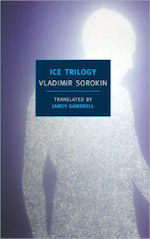 Vladimir Sorokin may well be one of the best-known Russian writers of strange fiction in the United States. He’s politically outspoken, and running through many of his novels is a kind of funhouse critique of political nostalgia paired with a bleak realism about its actual effects. His recent novel The Blizzard is a pitch-perfect example of this, set in a landscape that involves archaic technology, bizarre animals, political strife, and a zombie plague. In the earlier Ice Trilogy, Sorokin examines a very different mania and presents a world in which an absolutely outrageous belief system might be true. In the world of this novel, immortal beings in human form are awakened when struck in the chest by hammers made from ice; they go about their business in secret, preparing for a transcendental event. Or perhaps this is an epic chronicle of a shared delusion that encompasses most of the 20th Century, moving from Russia under the Tsars to that nation’s transition to a capitalist economy. Heady and chilling in equal measure, this is a bizarre journey worth taking.
Vladimir Sorokin may well be one of the best-known Russian writers of strange fiction in the United States. He’s politically outspoken, and running through many of his novels is a kind of funhouse critique of political nostalgia paired with a bleak realism about its actual effects. His recent novel The Blizzard is a pitch-perfect example of this, set in a landscape that involves archaic technology, bizarre animals, political strife, and a zombie plague. In the earlier Ice Trilogy, Sorokin examines a very different mania and presents a world in which an absolutely outrageous belief system might be true. In the world of this novel, immortal beings in human form are awakened when struck in the chest by hammers made from ice; they go about their business in secret, preparing for a transcendental event. Or perhaps this is an epic chronicle of a shared delusion that encompasses most of the 20th Century, moving from Russia under the Tsars to that nation’s transition to a capitalist economy. Heady and chilling in equal measure, this is a bizarre journey worth taking.
Top image: Podgaric Monument, Croatia. Photo by Kempenaers.
Tobias Carroll is the managing editor of Vol.1 Brooklyn. He is the author of the short story collectionTransitory (Civil Coping Mechanisms) and the novel Reel (Rare Bird Books).










I don’t know how much censorship is in Russia right now, but I’ve always thought censorship can result in fine art as the artists figure ways around it. The tradition of the USSR made lots of political novels that got by censors. The same thing happened in the U.S. when sex was heavily censored.
Would Dmitry Glukhovsky’s Metro 2033 novels (and/or the video game adaptations) count?
Very nice list. The image at the top, which looks like something from the Legend of Zelda, is the Podgarić Monument, in Croatia. Not strictly Soviet (or post Soviet), but appropriate anyway.
The Secret History of Moscow, by Ekaterina Sedia: “Galina is a young woman, caught like many of her contemporaries in the new economic uncertainty and apparent lawlessness of the country [early 1990s]. In the midst of all this chaos, her sister Maria turns into a jackdaw and flies away . . . prompting Galina to help Yakov, a policeman investigating a rash of recent disappearances. Their search will take them to the underground realm of hidden histories and archetypes, to find themselves caught between reality and myth, past and present, truth and betrayal.”